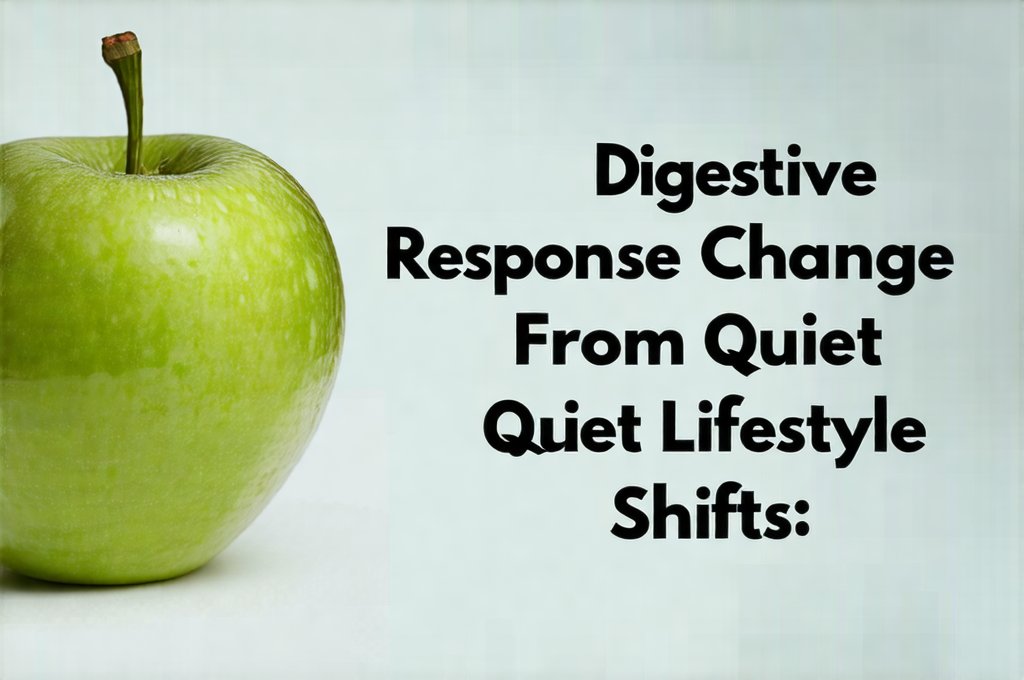Our digestive systems are remarkably adaptable, constantly responding to the foods we eat and the lifestyles we lead. For many people, significant changes to digestion aren’t triggered by illness, but rather by seemingly small shifts in daily habits – a new work schedule, an increase or decrease in physical activity, even subtle alterations in stress levels. These quiet lifestyle adjustments can profoundly impact how efficiently our bodies break down food, absorb nutrients, and eliminate waste. Understanding this intricate relationship between lifestyle and digestion is key to maintaining overall health and well-being; it’s about recognizing that the gut isn’t an isolated organ but a central player responding dynamically to everything we do.
The modern world often presents us with choices that inadvertently disrupt our digestive harmony. We might opt for convenience over nourishment, prioritize work over rest, or become chronically stressed without realizing the toll this takes on our internal systems. It’s easy to attribute digestive discomfort to food intolerances when, in reality, the root cause may lie in a change of routine that affects motility, enzyme production, or even the composition of our gut microbiome. This article explores how subtle lifestyle changes can alter your digestive response and offers insights into supporting healthy digestion through mindful adjustments.
The Impact of Routine Shifts on Digestive Function
Changes to daily routines are almost inevitable, but they frequently introduce stressors for the digestive system. Think about transitioning from a consistently scheduled work life to one with unpredictable hours – or even switching from a desk job to one requiring physical labor. These shifts can directly impact digestive motility, the rate at which food moves through your gastrointestinal tract. A sedentary lifestyle generally slows down digestion, while increased activity can sometimes speed it up, potentially leading to issues like diarrhea or incomplete nutrient absorption if the body isn’t given time to adapt. Moreover, irregular meal times disrupt the natural digestive rhythm and can affect enzyme production. Your body learns to anticipate food at certain times; when that predictability is removed, the digestive process becomes less efficient.
The gut-brain axis plays a critical role here. Stress, inherent in many lifestyle changes (new job, move, relationship change), directly influences digestion. When we’re stressed, our bodies release cortisol, which can suppress digestive function and divert blood flow away from the gut. This can result in symptoms like bloating, constipation, or even irritable bowel syndrome flares. Conversely, a calmer, more routine lifestyle promotes balanced hormone levels and healthier digestive processes. It’s not just about avoiding stress; it’s about managing it effectively and building resilience within your system. You might find helpful information when evaluating gut response to these changes.
Beyond motility and cortisol, consider the impact on food choices. When routines change, we often resort to quicker, less nutritious options – takeout, processed snacks, or skipped meals altogether. These dietary shifts lack fiber, essential nutrients, and probiotics vital for gut health, further exacerbating digestive issues. A sudden change in diet, even a seemingly “healthy” one (like drastically increasing fiber intake without adequate hydration), can also overwhelm the system if it’s not introduced gradually. The key takeaway is that digestion thrives on consistency and mindful adaptation. Understanding key takeaways from tracking your digestive data can help you stay consistent.
Understanding Gut Microbiome Disruption
Our gut microbiome – the trillions of bacteria, fungi, viruses and other microorganisms living in our digestive tract – is incredibly sensitive to lifestyle changes. It’s a dynamic ecosystem that relies on a consistent supply of nutrients from our diet and a stable internal environment. A change in routine can quickly disrupt this balance, leading to dysbiosis, an imbalance in the gut microbiome. Factors like altered eating patterns (less fiber, more sugar), increased stress, or antibiotic use (even if unrelated to the lifestyle shift) all contribute to dysbiosis.
Dysbiosis isn’t just about digestive symptoms; it can impact overall health. A compromised gut microbiome is linked to weakened immunity, mood disorders, and even chronic diseases. Restoring balance requires a multifaceted approach: – Increasing fiber intake from diverse sources (fruits, vegetables, whole grains). – Incorporating probiotic-rich foods like yogurt, kefir, or sauerkraut. – Managing stress through techniques like meditation or yoga. – Avoiding unnecessary antibiotic use. Consider how digestive enzymes differ from probiotics to best support your gut health.
The relationship between the microbiome and lifestyle is bidirectional. A healthy gut supports a more resilient response to stress and promotes better mental well-being, which in turn further benefits digestive function. It’s a positive feedback loop that emphasizes the importance of prioritizing gut health as part of any lifestyle change. Cultivating a diverse and thriving microbiome is one of the most powerful things you can do for your overall health. If inflammation is impacting your digestion, consider how inflammation alters digestive enzyme response.
The Role of Hydration and Movement
Often overlooked, hydration plays a crucial role in digestive health, particularly when routines shift. When we change our activity levels or environment (e.g., traveling to a hotter climate), our bodies require more fluids. Dehydration slows down digestion, leading to constipation and discomfort. It also hinders nutrient absorption and can exacerbate stress on the gut lining. Aim for consistent water intake throughout the day, not just when you feel thirsty. Consider factors like activity level, climate, and diet when determining your hydration needs.
Similarly, physical activity is essential for maintaining healthy digestion. Movement stimulates peristalsis – the wave-like contractions that move food through the digestive tract. When we become more sedentary due to a lifestyle change, digestion slows down and becomes less efficient. Even moderate exercise, such as walking or yoga, can significantly improve digestive function. Here’s how to incorporate movement: 1. Schedule regular physical activity into your routine. 2. Take short walks during breaks throughout the day. 3. Incorporate stretching exercises to promote blood flow and relaxation. Top lifestyle shifts can support long term enzyme production.
The combination of adequate hydration and consistent movement creates a synergistic effect that supports optimal digestion, even amidst lifestyle changes. It’s about proactively counteracting the potential negative impacts of altered routines by prioritizing these fundamental health practices. Prioritizing both hydration and movement is not just beneficial for overall health; it’s vital for maintaining digestive resilience.
Mindful Eating as a Digestive Buffer
Mindful eating – paying attention to your food, savoring each bite, and eating without distractions – can be an incredibly powerful tool for supporting digestion during times of transition. When we eat quickly or while distracted (e.g., working at our desk, watching TV), we don’t fully chew our food, which places a greater burden on the digestive system. Mindful eating promotes thorough chewing, increasing saliva production and initiating the digestive process in the mouth. This also gives your brain time to register fullness cues, preventing overeating.
Moreover, mindful eating helps reduce stress levels associated with mealtimes. When we’re rushing or preoccupied, our bodies remain in a state of fight-or-flight, which inhibits digestion. Taking a few moments before each meal to focus on your breath and appreciate the food you’re about to consume can significantly improve digestive function. Here are some ways to practice mindful eating: – Eliminate distractions during meals. – Chew your food thoroughly. – Pay attention to the texture, flavor, and aroma of your food. – Eat slowly and savor each bite. For those experiencing discomfort in social settings, managing digestive noise can be helpful.
Mindful eating isn’t just a dietary technique; it’s a holistic approach that integrates mental well-being with physical health. It’s about cultivating a more conscious relationship with food and recognizing how lifestyle choices impact our bodies. By incorporating mindful eating into your routine, you can create a buffer against the digestive disruptions caused by changes in lifestyle.


















